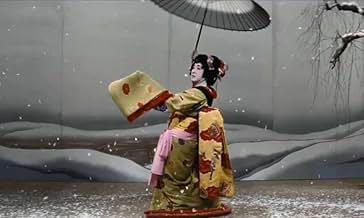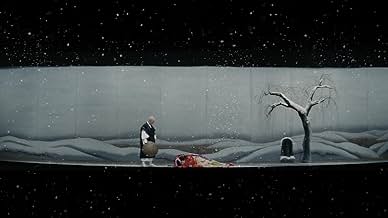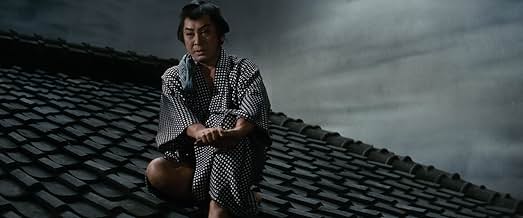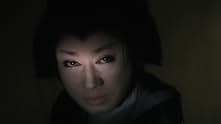PUNTUACIÓN EN IMDb
7,3/10
3 mil
TU PUNTUACIÓN
Añade un argumento en tu idiomaYukinojo, a Kabuki actor, seeks revenge by destroying the three men who caused the deaths of his parents. Also involved are the daughter of one of Yukinojo's targets, two master thieves, and... Leer todoYukinojo, a Kabuki actor, seeks revenge by destroying the three men who caused the deaths of his parents. Also involved are the daughter of one of Yukinojo's targets, two master thieves, and a swordsman who himself is out to kill Yukinojo.Yukinojo, a Kabuki actor, seeks revenge by destroying the three men who caused the deaths of his parents. Also involved are the daughter of one of Yukinojo's targets, two master thieves, and a swordsman who himself is out to kill Yukinojo.
- Dirección
- Guión
- Reparto principal
- Premios
- 1 premio en total
Reseñas destacadas
10mkiem
Ichikawa supposedly made this movie "to see what cinema could do." He pulls out all the stops and the result is a masterpiece of visual splendor, wit and style that is stunning as well as very entertaining. The story of a man taking revenge against the people who killed his parents is an old cliched melodrama that was assigned to him. But he turns necessity into a virtue by glorifying the kitsch while at the same time keeping an ironic stance. (don't miss a great visual pun involving a gunshot and a crescent moon.)
He uses the widescreen to full effect in adopting the aesthetics of the Kabuki theater. The sheer visual inventiveness of the movie makes for the best kind of eye candy. There are bold splashes of primary colors and dramatic, very theatrical lighting. Some sets are intentionally artificial-looking while others are not. Somehow the two styles don't clash but instead portray the perfect intermingling of theater and cinema. Similarly, the use of jazz and lounge music(!) seems perfectly appropriate.
Hasegawa, the lead actor, played the same role in a previous version of the movie nearly 30 years earlier. A man who acts like a woman, seducing a woman young enough to be his daughter lends a touch of the bizarre which just makes things more interesting. The movie is graced by Ayako Wakao, at the height of her incredible beauty.
He uses the widescreen to full effect in adopting the aesthetics of the Kabuki theater. The sheer visual inventiveness of the movie makes for the best kind of eye candy. There are bold splashes of primary colors and dramatic, very theatrical lighting. Some sets are intentionally artificial-looking while others are not. Somehow the two styles don't clash but instead portray the perfect intermingling of theater and cinema. Similarly, the use of jazz and lounge music(!) seems perfectly appropriate.
Hasegawa, the lead actor, played the same role in a previous version of the movie nearly 30 years earlier. A man who acts like a woman, seducing a woman young enough to be his daughter lends a touch of the bizarre which just makes things more interesting. The movie is graced by Ayako Wakao, at the height of her incredible beauty.
I have seen several hundred Japanese films but am far from an expert on these movies. After all, I am not Japanese and don't always understand some of the subtleties in the pictures. For example, in "An Actor's Revenge", the main character (Yukinojo) is a man who performs as a woman on stage--that I knew and understood. However, he maintained this persona off-stage as well and I wondered just how unusual this was--did other male Kabuki actors also maintain this persona when they weren't acting? If you can answer this question, I would love to hear from you.
The film begins at a Kabuki performance. Yukinojo has recently come to Edo (Tokyo) and has been planning revenge on three scoundrels for many years. It seemed these wicked men were responsible for destroying his family and he sees himself as the instrument of revenge--much like the character in another famous Japanese film, "Lady Snowblood". However, he doesn't want to just stab them--he wants to have them linger and give him a chance to revel in their destruction. Part of it, however, depends on using the daughter of one of these wicked men--and the lady is innocent of causing any harm to anyone. What's Yukinojo to do? And, what is he to do when several ancillary characters blunder or wander into his plans?
There were several things I liked about the film. First, the various thieves who were no necessary to the film helped to give the film greater depth and, in an odd way, fun. Second, the film was made in many ways like the entire production was ALL part of a play. Often, using interesting lighting and sets, it looked as if the line between the off-stage and on-stage was often blurred. It made the film truly memorable. Overall, well worth seeing and gloriously artistic.
The film begins at a Kabuki performance. Yukinojo has recently come to Edo (Tokyo) and has been planning revenge on three scoundrels for many years. It seemed these wicked men were responsible for destroying his family and he sees himself as the instrument of revenge--much like the character in another famous Japanese film, "Lady Snowblood". However, he doesn't want to just stab them--he wants to have them linger and give him a chance to revel in their destruction. Part of it, however, depends on using the daughter of one of these wicked men--and the lady is innocent of causing any harm to anyone. What's Yukinojo to do? And, what is he to do when several ancillary characters blunder or wander into his plans?
There were several things I liked about the film. First, the various thieves who were no necessary to the film helped to give the film greater depth and, in an odd way, fun. Second, the film was made in many ways like the entire production was ALL part of a play. Often, using interesting lighting and sets, it looked as if the line between the off-stage and on-stage was often blurred. It made the film truly memorable. Overall, well worth seeing and gloriously artistic.
This movie is that rare species - a film that doesn't take itself seriously for a moment, and yet is stunningly well made and original.
According to Donald Richies '100 Years of Japanese Cinema' the director was forced to make this movie (the remake of a popular but very hammy 1930's original) as a punishment for his self indulgence in earlier movies. He responded by turning up the campiness to '11' in Spinal Tap terms.
Kon Ichikawa manages to take the story of a famous Kabuki female impersonator who wrecks revenge on three powerful men who killed his parents both beautiful (the scenery and photography is stunning) and queasy - everyone seems to fall in love with the rather ugly and very feminine leading 'man'. The story is irrelevant (presumably deliberately so), its all an exercise in style. You can see where Suzuki and many other later directors got a lot of their ideas. Kon is a very talented and skillful film maker so despite the fact that the cast are clearly playing it up for laughs, it is extremely well made, with wonderful sets and tight editing. Despite its origins, it is genuinely entertaining and required viewing for anyone with an interest in Kabuki or Japanese design.
According to Donald Richies '100 Years of Japanese Cinema' the director was forced to make this movie (the remake of a popular but very hammy 1930's original) as a punishment for his self indulgence in earlier movies. He responded by turning up the campiness to '11' in Spinal Tap terms.
Kon Ichikawa manages to take the story of a famous Kabuki female impersonator who wrecks revenge on three powerful men who killed his parents both beautiful (the scenery and photography is stunning) and queasy - everyone seems to fall in love with the rather ugly and very feminine leading 'man'. The story is irrelevant (presumably deliberately so), its all an exercise in style. You can see where Suzuki and many other later directors got a lot of their ideas. Kon is a very talented and skillful film maker so despite the fact that the cast are clearly playing it up for laughs, it is extremely well made, with wonderful sets and tight editing. Despite its origins, it is genuinely entertaining and required viewing for anyone with an interest in Kabuki or Japanese design.
This movie is quite unlike any other I have ever seen. Oddly, one of the strangest things about it is the lighting. Much of the action occurs in the dark with just spotlights on the actors. This gives it a very stagy surreal feel. It takes place in historic Japan where people demonstrate their wealth not by cramming rooms with furniture, but by having gigantic carpeted empty rooms, with nothing in them but perhaps a stool. I found these starkly elegant and immensely pleasing. The exotic are things that come from Holland. It is fun looking through the Japanese side of the lens of history.
Characters often pose perfectly still for minutes an a time while some other character does something or narrates.
Yuki is a male who plays female roles in traditional Kabuki theatre. He always appears in elaborate female clothes. He is has a double chin. He is quite homely, both as male and female, but for reasons never satisfactorily explained seems irresistible to both males and females even though there are many other characters of either sex much better looking. He is also skilled at sword fighting. He is preposterously polite, effusive and self-effacing. The basic plot is seeking revenge for horrible things three men did to his parents. He subtly manipulates his enemies to do each other in.
A kabuki actor who wanders around is drag offstage does not seem to raise any eyebrows, except for people who don't realise he as an actor. Nobody seems to be the tiniest bit embarrassed by their attraction to him, perhaps annoyed or frustrated, but not ashamed.
The plot is operatic, very high emotions and drastic crazy behaviour. Kabuki theatre is definitely an acquired taste, but this movie is quite accessible and anything but boring.
There is one actor who plays two major roles. They give you a hint who it is near the end of the movie. See if you can pick it out earlier.
Characters often pose perfectly still for minutes an a time while some other character does something or narrates.
Yuki is a male who plays female roles in traditional Kabuki theatre. He always appears in elaborate female clothes. He is has a double chin. He is quite homely, both as male and female, but for reasons never satisfactorily explained seems irresistible to both males and females even though there are many other characters of either sex much better looking. He is also skilled at sword fighting. He is preposterously polite, effusive and self-effacing. The basic plot is seeking revenge for horrible things three men did to his parents. He subtly manipulates his enemies to do each other in.
A kabuki actor who wanders around is drag offstage does not seem to raise any eyebrows, except for people who don't realise he as an actor. Nobody seems to be the tiniest bit embarrassed by their attraction to him, perhaps annoyed or frustrated, but not ashamed.
The plot is operatic, very high emotions and drastic crazy behaviour. Kabuki theatre is definitely an acquired taste, but this movie is quite accessible and anything but boring.
There is one actor who plays two major roles. They give you a hint who it is near the end of the movie. See if you can pick it out earlier.
As the curtains move aside, those wanting straight-up blood and carnage, will find that "AN ACTOR'S REVENGE" goes down a different path, in what is more a patient theatrical drama of cunning revenge. And a visually striking one too. I was impressed by the audacious wide scope photography and tonal lighting of its stylistic aesthetics, which helped set up the mood and story.
Kazuo Hasegawa superbly plays a kabuki lead actor Yukinojo Nakamura, specializing as an onnagata (otherwise a female impersonator). His travelling troupe happens to be performing in the village of the three men who drove his parents to suicide when he was a child. How he goes about his revenge is like an actor playing out a part, yet he obviously takes no pleasure out of it with conflicting thoughts and hesitations. Keeping to his strengths though, he manipulates everything to his advantage using his talents and sensuality to a spin a web, and in doing so, causing unwanted grief without physical harm. He doesn't want them to die a swift death, but he wants to ruin them in the attempt to drive them mad, like they did to his parents.
The material interestingly looks at how sometimes in this quest innocence can be a casualty, and even completing this vengeance, the emotions can't fulfill that loneliness that will always linger. Sometimes that emptiness is replaced by haunting thoughts of those you destroyed to see it through. As this revenge is set in motion, there are certain unplanned obstacles, leading him to show his skill with the blade. To be honest, the few moonlight standoff scenes are quick and nothing spectacular, but it's the imagery and framing of those moments that do stand out. Director Kon Ichikawa does so much with so little. Etched with dazzling details, compact sets, thick on slow exposition and meditative characters (even jarring comic relief) in what is a classy, if distant stage play brought to life.
Kazuo Hasegawa superbly plays a kabuki lead actor Yukinojo Nakamura, specializing as an onnagata (otherwise a female impersonator). His travelling troupe happens to be performing in the village of the three men who drove his parents to suicide when he was a child. How he goes about his revenge is like an actor playing out a part, yet he obviously takes no pleasure out of it with conflicting thoughts and hesitations. Keeping to his strengths though, he manipulates everything to his advantage using his talents and sensuality to a spin a web, and in doing so, causing unwanted grief without physical harm. He doesn't want them to die a swift death, but he wants to ruin them in the attempt to drive them mad, like they did to his parents.
The material interestingly looks at how sometimes in this quest innocence can be a casualty, and even completing this vengeance, the emotions can't fulfill that loneliness that will always linger. Sometimes that emptiness is replaced by haunting thoughts of those you destroyed to see it through. As this revenge is set in motion, there are certain unplanned obstacles, leading him to show his skill with the blade. To be honest, the few moonlight standoff scenes are quick and nothing spectacular, but it's the imagery and framing of those moments that do stand out. Director Kon Ichikawa does so much with so little. Etched with dazzling details, compact sets, thick on slow exposition and meditative characters (even jarring comic relief) in what is a classy, if distant stage play brought to life.
¿Sabías que...?
- CuriosidadesOriginally designed as a tribute to actor Kazuo Hasegawa, whose 300th film this was. The film was based Teinosuke Kinugasa's Yukinojô henge: Daiippen (1935) which also starred Hasegawa in the same dual role.
- ConexionesVersion of Yukinojô henge: Daiippen (1935)
Selecciones populares
Inicia sesión para calificar y añadir a tu lista para recibir recomendaciones personalizadas
- How long is An Actor's Revenge?Con tecnología de Alexa
Detalles
- Duración1 hora 55 minutos
- Mezcla de sonido
- Relación de aspecto
- 2.35 : 1
Contribuir a esta página
Sugerir un cambio o añadir el contenido que falta

Principal laguna de datos
By what name was La venganza de un actor (1963) officially released in India in English?
Responde





























